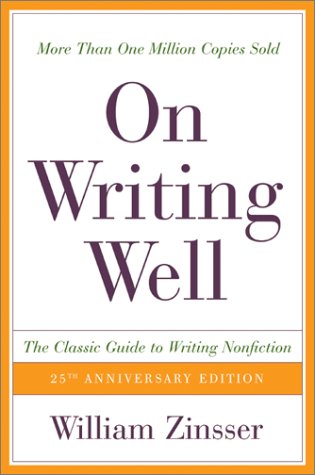Confidence is key, or so William Zinsser would undoubtedly assert. Zinsser himself oozes humorous confidence as he single-handedly defines what it is to “write well.” However, like many memorable literary characters, Zinsser’s most distinguishing trait produces both his greatest strengths and his fatal flaw.
On Writing Well, by William Zinsser, seemingly covers every aspect of non-fiction writing that could possibly be taught. The man I came to view as a mad professor tackles everything in four fairly independent parts: principles, methods, forms and attitudes. One of the beauties of the book is the hybrid style between textbook and narrative. Each chapter can be read to its fullest potential as a stand-alone reference. However within the chapter the reader is enveloped in Zinsser’s clever rants about the neglect of the subject at hand. Most often he spins his lessons into a series of common errors to be avoided, with minimal advice on how to then craft the skills correctly instead. The technique is clever; the notion that one learns best from their mistakes is certainly true and it even more convenient when it is the mistakes of others, whom you can ridicule in the process. By teaching through negatives Zinsser avoids unintentionally dismissing perfectly valid styles, important because of the broad possibilities of ways to write correctly.
If you and Zinsser agree, a more enjoyable textbook is nowhere to be found. His witty tone turns even the pickiest of grammar rules into an amusing anecdote. While discussing the importance of using periods, Zinsser writes, “And don’t tell me about Norman Mailer‒ he’s a genius. If you want to write long sentences, be a genius” (72). The snarky comment makes an otherwise bland punctuation lesson memorable. For every assertion Zinsser makes, he supports it with example of the contrary, poking fun at well-read newspapers and politicians. He relies especially heavily on government statements when making his point about simplicity, effective as most people can relate to wishing government statements had his simplicity. His sarcastic humor, while often still condescending, allows him to pick apart samples of writing without depicting himself as an overly judgmental or distasteful editor. More than any intriguing point Zinsser made or tip he offered it was Zinsser’s entertaining tone that encouraged me to keep reading. After some time the subject matter became very secondary in comparison to the entertainment Zinsser’s stories offered.
In a Zinsser-like fashion, I started the last paragraph with a qualifier, and I stand by it. When I had no preconceived arguments against Zinsser’s assertions, I loved him. On the other hand, when it was characteristics of writing that I enjoy being thrown under the bus, I did not. Also in a Zinsser-like fashion I will contradict myself in order to cover all aspects of an argument; yes, Zinsser’s witty tone allows him to get away with criticisms that would otherwise be untastefully opinionated, but Zinsser was still repeatedly untastefully opinionated. While reading his absolute statements about rules I have no opinion on, it is easy to take Zinsser’s stylistic opinion as fact. His constant but subtle ethos enforcers (he did not forget to mention he taught at Yale) leave no reason to question his literary authority. Now when Zinsser tries to say the word “‘prioritize’ is jargon” (45) my word-loving defenses go up. Immediately Zinsser’s witty tone distorts into authoritarian and bias dictation. The man has no right to definitively decide the quality of my favorite word, regardless of his overwhelmingly dignified career.
I respect Zinsser for his dedication to the trade. He says himself, “Good writing is lean and confident…Be bold” (72). Zinsser certainly follows his own advice. If we take a moment to appreciate the boldness required in writing a book simply titled, “On Writing Well,” we must respect the unwinnable challenge Zinsser accepted. To have any credibility he had to write well, and follow the rules he wrote. Some of his rules contradict each other; Zinsser concedes that style and simplicity, two of his strongest teaching points, are not an easy combination to balance. He had to take a stand and stick with it, the way he teaches, even when others, including myself, do not always like it. But Zinsser is clever, and so intriguing that our small disagreements did not prevent me from continuing to read. In this Zinsser validates one of his most important points regarding audience: “You are writing primarily to please yourself, and if you go about it with enjoyment you will also entertain the readers who are worth writing for.”
Works Cited
Zinsser, William. On Writing Well: The Classic Guide to Writing Nonfiction. 25th Anniversary
ed. New York: Quill, 2001. Print.

No comments:
Post a Comment